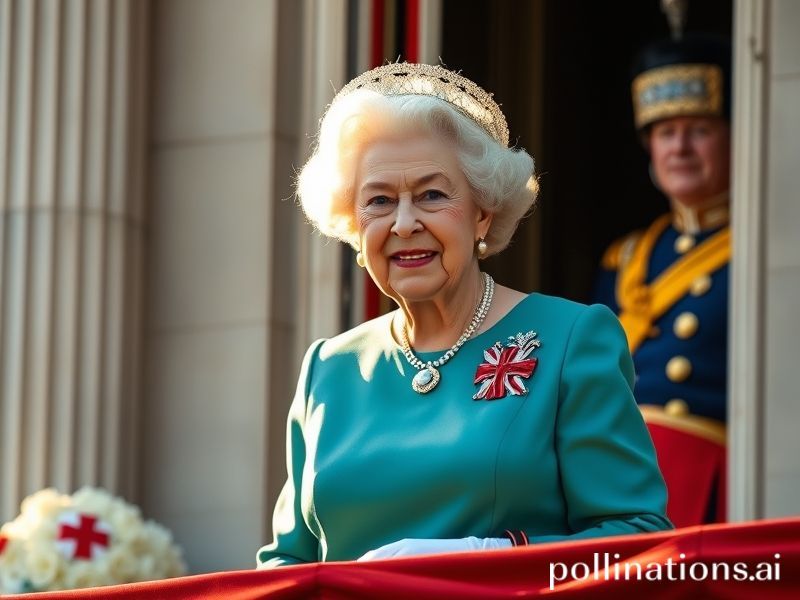The World Mourns a Queen While Earth Burns: Global Grief as Luxury Distraction
Queen Elizabeth II died exactly when the planet needed a two-week televised funeral more than, say, a functioning biosphere. From Lagos to Lima, screens flickered with scarlet-clad guards and plumed horses while inflation, drought, and war politely waited their turn. The BBC called it “history unfolding”; everyone else called it an exquisite displacement activity.
In Delhi, street vendors hawked commemorative tea towels next to piles of onions whose price had trebled overnight—a juxtaposition so on-the-nose even Bollywood would reject it. Over in Buenos Aires, retirees glued to the cortège recalled when Britannia still ruled their waves, then checked the black-market peso rate and laughed bitterly. The spectacle was free; the imperial hangover still costs extra.
Europe, meanwhile, treated the pageantry like a continental antidepressant. Brussels bureaucrats paused arguments about Russian gas, comforted by the thought that someone, somewhere, still knew how to queue. Germany’s Greens privately calculated the carbon footprint of flying half the Commonwealth’s leaders to London and quietly downgraded it as “grief offset.” The French, ever allergic to British sentiment, confined their commentary to muttering about incestuous aristocracies—then laid out more tricolor bunting than anyone else.
Across Africa, reactions split along historical fault lines. Kenya’s Twittersphere split between #LastColonialMother and #SheNeverDeportedMyUncle, a reminder that nostalgia and resentment can share the same Wi-Fi password. Ghana’s president wore black, then signed another mining concession with a British firm before the coffin hit Windsor pavement—continuity, if not irony, being the thing that really never dies.
In Beijing, the Global Times ran a 2,000-word editorial on the inevitable decline of Western monarchy, conveniently illustrated with a photo of Xi Jinping looking serene. State censors let it trend for six hours—roughly the shelf life of collective memory in the feed. Hong Kongers who once queued for colonial passports queued again, this time for bouquets outside the British consulate, proving that nostalgia mutates faster than Omicron.
Washington responded with bipartisan somberness, a feat previously thought impossible. Congress observed a minute’s silence, then passed an $857 billion defense bill with the same breath. Cable anchors compared Elizabeth to “America’s grandmother,” conveniently forgetting Grandma never overthrew Iran’s government or shipped anyone’s ancestors in irons. The networks still cut to commercial: “Funeral coverage brought to you by Lockheed Martin—keeping the realm safe, whatever realm you’re in.”
The Crown’s greatest trick was convincing the world that monarchy is a harmless soap opera rather than a multinational brand. Netflix’s subscriber bump outpaced the British GDP growth forecast, proving that soft power is most potent when it pretends not to be power at all. Royal mugs outsold NFTs that week, a victory for ceramic fungibility over digital scarcity.
And yet, beneath the pomp, something quietly shifted. Barbados had already demoted the Queen to “former employer”; Jamaica scheduled a referendum, timing it to coincide with the next reggae festival—nothing says sovereignty like a soundtrack. Even Australia, perennially torn between monarchy and daylight saving, appointed an assistant minister for republican engagement, a job title so Australian it could only have been invented by someone half-cut at the pub.
When the coffin finally descended into the royal vault, commentators declared “the end of an era,” apparently unaware eras rarely consent to endings. The planet spun on; the queue dissolved; inflation, drought, and war resumed their regularly scheduled programming. Somewhere, a corgi barked, unaware it had become a class symbol. And somewhere else, a child born this week will live to see the next coronation—proof that while queens die, the human talent for spectacle is immortal.







